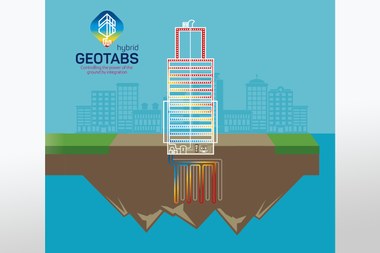hybridGEOTABS
hybridGEOTABS is a four year European research and innovation project that brought together a transdisciplinary team of 12 partners including SMEs, large industry and research institutes from various EU countries. The project is coordinated by the Ghent University research group building physics (prof. Jelle Laverge).
What is hybridGEOTABS?
GEOTABS is an acronym for a GEOthermal heat pump combined with a Thermally Activated Building System (TABS). GEOTABS systems combine the use of geothermal energy, which is an almost limitless and ubiquitous energy source, with radiant heating and cooling systems, that can provide very comfortable conditioning of the indoor space. GEOTABS hybrid refers to the integration of GEOTABS with secondary heating and cooling systems and other renewables, offering huge potential to meet heating and cooling needs in office buildings, care homes, schools and multi-family buildings throughout Europe in a sustainable way.
By use of Model Predictive Control (MPC), a new control-integrated building design procedure and a readily applicable commercial system solution in hybridGEOTABS, the overall efficiency of heating and cooling will be significantly improved in comparison to current best practice GEOTABS systems and its competitiveness will be strengthened.
The UGent-team focuses on (1) the development of a hybridGEOTABS design strategy consisting of easy-to-use guidelines or tools for the feasibility assessment and predesign of hybridGEOTABS buildings; (2) the demonstration and People-Planet-Profit-validation of the hybridGEOTABS concept, amongst others by use of demonstration buildings and building stock models; and (3) the overall technical and administrative management of the project.
hybridGEOTABS project and demonstration buildings (shortfilm)
This project has received funding from the European Union’s Horizon 2020 research and innovation programme under grant agreement No 723649 (Project Acronym: MPC-.GT).
Project Info
Research group: Building Physics
Academic year: 2017 / 2018
Researchers: Jelle Laverge, Eline Himpe, Wim Boydens, Rana Mahmoud, Mohsen Sharifi and Josué Borrajo Bastero
